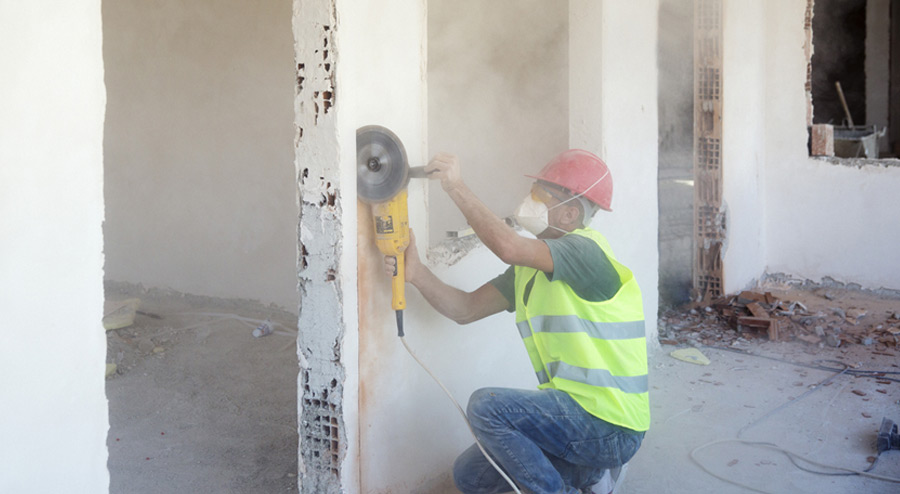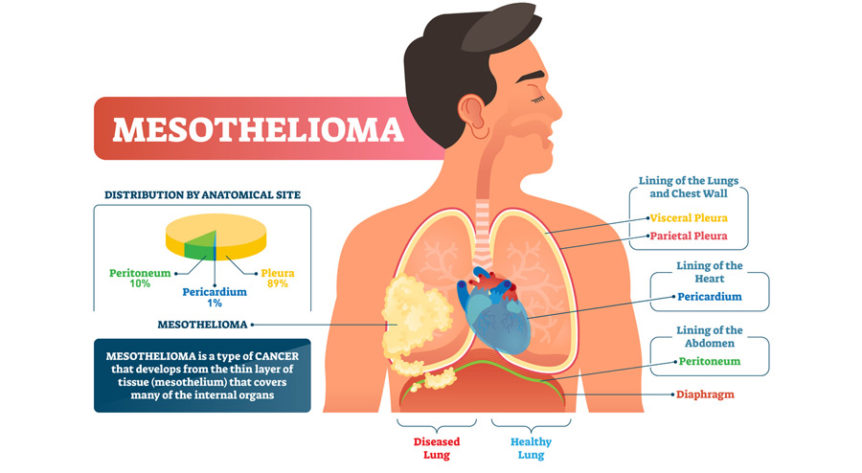Mesothelioma is cancer of the mesothelium, the thin layer of tissue that covers most of your internal organs. It’s caused by exposure to asbestos and usually doesn’t develop in mesothelioma patients until 20 to 50 years after exposure. Treatment, such as radiation therapy or chemotherapy, is available for asbestos-related diseases but because this is such aggressive cancer (especially lung cancer), it’s difficult to treat and very deadly.
Are There Different Types of Mesothelioma?
Yes, there are several different forms of mesothelioma, though some are fairly rare.
Malignant Pleural Mesothelioma
Malignant pleural mesothelioma is the most common form and affects the tissue surrounding the lungs of mesothelioma patients. Symptoms of mesothelioma can include chest pain or fluid in the chest cavity, coughing, shortness of breath, unexplained weight loss, and unusual lumps of tissue (a tumor) beneath the skin across your chest.
Peritoneal Mesothelioma
The peritoneum is the thin layer of tissue that surrounds the abdomen. Signs and symptoms of this form of mesothelioma include abdominal pain or swelling, unexpected weight loss, and nausea.
Rare Forms of Mesothelioma
Though rare, there are other forms of mesothelioma that affect the heart and testicles.
Pericardial mesothelioma affects the tissue around the heart and can cause chest pain and difficulty breathing. The tunica vaginalis is the thin tissue surrounding the testicles. This rare form of mesothelioma may present as swelling or a mass on one or both testicles.
What Does Mesothelioma Do to the Body?
Because this cancer grows primarily along the surface of the lungs, this disease can cause more pain for the patient than other types of cancer due to significant nerve innervation. Cancer also restricts the ability of the lungs to expand which can cause breathing difficulties. Nodules and tumors can also fill the pleural space between the lungs and the chest wall. While it can spread to lymph nodes surrounding the chest and into the lung tissue, it does not usually metastasize to other areas of the body.
Once diagnosed with mesothelioma, there aren’t any effective treatments for curing it. Treatment focuses on maintaining the quality of life for as long as possible by relieving pain and associated symptoms.
Is Mesothelioma Common?
Only around 3,000 new cases of mesothelioma are diagnosed every year. By comparison, there are 200,000 cases of lung cancer diagnosed every year.
Mesothelioma is now fairly rare; however, the rate of mesothelioma diagnoses increased significantly between the 1970s and early 1990s. This is likely due to significant changes in workplace safety to limit asbestos exposure. Sadly, long-term survival once diagnosed with this malignant disease is rare, even if the symptoms are spotted at the early stages.
Who Is at Risk for Mesothelioma?

Anyone who has ever been exposed to asbestos is at risk for mesothelioma. There are certain demographics that have a much higher risk of exposure.
A typical mesothelioma sufferer is male over 65 with a history of military or blue-collar work simply because these professions have an increased risk for asbestos exposure. Specific at-risk occupations include anyone who worked in construction, manufacturing, chemical refining, or shipbuilding.
Do You Have Any Legal Recourse if You’ve Been Diagnosed with Mesothelioma?
If you’ve been diagnosed with mesothelioma and you believe your asbestos exposure occurred in the workplace, you may be able to take legal action. Because this is such an aggressive form of cancer, it’s important to start looking into this option as soon after diagnosis as possible.
In order to prove that a former employer was negligent, a worker has to show that the employer was required to protect the worker from asbestos exposure but did not do so. They also have to show that this breach of duty caused harm to the worker.
OSHA requires that all employers monitor quality and provide proper protective equipment if asbestos is detected and limit the time workers are in areas where possible exposure can occur. A breach can occur in many ways, including:
- Failing to properly monitor the air for asbestos
- Not using proper ventilation systems in at-risk areas
- Not providing personal monitoring devices to employees
- Failing to limit the number of time workers spent in infected areas
If a lawyer is able to prove negligence, the financial settlement can be quite substantial. Some settlements cover lost wages from time away from work, pain and suffering, and a decreased in quality of life due to the injury. Proving negligence can be difficult, though. It’s not always easy to prove asbestos exposure.
Choosing the Right Attorney
If you decide to seek damages, it’s best to choose an attorney that specializes in mesothelioma to help you through the process.
Your lawyer will help determine who is responsible for your asbestos exposure and decide where to file your lawsuit. Then, they’ll file a written complaint with the court on your behalf to get the process started. There are specific rules for these cases which is why it’s so important to use an attorney experienced in mesothelioma claims.
Each party named as a defendant will be given a defined period of time to respond, usually about 30 days. Because 20 to 50 years can pass between exposure and diagnosis, it’s often hard to locate the company responsible for the exposure so this step might take some time. It’s also for this reason that a lot of defendants won’t admit fault.
If no settlement is reached between you and the defendants, the case proceeds to discovery where lawyers on both sides gather as much useful information as possible. This can include your medical history, work history, and personal life. The case then proceeds to trial.
Sometimes, defendants will offer a settlement before or even during the court proceedings. Your attorney will negotiate for you but, ultimately, you’ll need to decide whether to take the settlement or go ahead with the trial. If you do go to trial and you win, the defendant has a limited amount of time to appeal. If they win in the appeals court, they may not have to pay anything at all or they may end up paying less than the initial amount awarded by the court.
Don’t Wait
If you’re suffering from mesothelioma and believe a former employer is to blame, time is of the essence. This is an aggressive disease and the sooner you get the process started, the better.
